Title: "The Future of Artificial Intelligence: Transforming Industries and Empowering Humanity"
By Suvash Sah

Introduction:
Artificial Intelligence (AI) has rapidly emerged as a transformative technology, revolutionizing industries and reshaping our daily lives. With remarkable advancements in machine learning, deep learning, and natural language processing, AI has proven to be a game-changer across various sectors. As we step into the future, the potential of AI to solve complex problems, enhance efficiency, and improve decision-making is only beginning to unfold. In this article, we explore the current state of AI and its promising future, highlighting its impact on industries and its potential to empower humanity.
The Power of AI in Industries:
1.1 Healthcare:
AI is revolutionizing the healthcare industry by improving diagnostics, personalized treatment plans, and drug discovery. Machine learning algorithms can analyze vast amounts of medical data to detect patterns and predict disease progression. AI-powered robots and virtual assistants can provide personalized care and companionship for the elderly or individuals with disabilities.
1.2 Finance:
The finance industry benefits from AI through automated trading systems, fraud detection algorithms, and personalized financial recommendations. AI algorithms can process enormous financial data sets to identify market trends, manage risks, and enhance investment strategies. Additionally, chatbots and virtual assistants streamline customer service and improve user experiences.
1.3 Transportation:
AI plays a crucial role in transforming transportation with self-driving cars, intelligent traffic management systems, and predictive maintenance. Autonomous vehicles are becoming more reliable and efficient, promising safer roads and reduced traffic congestion. AI algorithms optimize routes, predict maintenance requirements, and enhance logistics operations, revolutionizing the supply chain industry.
1.4 Manufacturing:
AI-driven automation is reshaping manufacturing by optimizing production processes, reducing costs, and improving quality control. Smart robots and AI-powered systems collaborate with human workers to perform complex tasks, leading to increased productivity and flexibility. Predictive maintenance algorithms prevent breakdowns and minimize downtime, saving resources and improving overall efficiency.
Ethical Considerations:
As AI continues to advance, ethical considerations become increasingly important. The potential for bias in AI algorithms and the impact of automation on jobs are critical concerns. It is crucial to ensure transparency, accountability, and fairness in AI systems. Developers and policymakers must collaborate to establish ethical guidelines that prioritize human values, privacy protection, and the responsible use of AI technology.
Empowering Humanity:
3.1 Education:
AI has the potential to transform education by providing personalized learning experiences tailored to individual students' needs. Intelligent tutoring systems can adapt to students' learning styles, pace, and strengths, enhancing engagement and knowledge retention. AI-powered virtual classrooms enable remote learning and bridge educational gaps, ensuring access to quality education for all.
3.2 Environmental Sustainability:
AI is instrumental in addressing environmental challenges. It helps in analyzing climate data, predicting natural disasters, and optimizing energy consumption. AI algorithms enable precision agriculture, minimizing resource wastage and maximizing crop yields. Smart grid systems powered by AI facilitate efficient energy distribution and management, promoting a sustainable future.
3.3 Social Welfare:
AI can empower society by improving social welfare systems, enhancing public safety, and assisting in humanitarian efforts. AI algorithms can analyze social data to identify at-risk individuals and prevent crises. Intelligent chatbots and virtual assistants provide mental health support and counseling. Furthermore, AI-powered translation tools break down language barriers, fostering global communication and collaboration.
Conclusion:
Artificial Intelligence is rapidly evolving and reshaping industries, revolutionizing healthcare, finance, transportation, manufacturing, and more. However, as AI continues to progress, it is essential to address ethical considerations and ensure responsible development and deployment. By harnessing the power of AI, we can create a future that empowers humanity, leveraging technology to improve education, foster sustainability, and enhance social welfare. As we navigate this transformative era, it is crucial to embrace AI





Comments
There are no comments for this story
Be the first to respond and start the conversation.